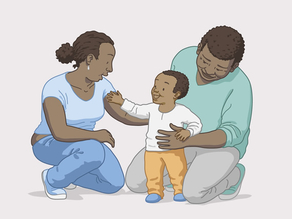Adoption
Adopting a child means that you become the legal parent of a child who is not your biological child.
You can adopt a child who is a member of your family (for example: a cousin), the child of your partner or a child you do not know. You can choose to adopt a Belgian child or a child from another country.
Adoption law is complex. Here you will find some basic information. Contact a specialised organisation for more questions and legal advice.
The adoption procedure can be done in Belgium if:
- the adoptive parent or the person who will be adopted has Belgian nationality or
- the usual place of residence of one of these persons is in Belgium.
Belgian law
Who can adopt?
- persons who have Belgian nationality or whose usual place of residence is in Belgium;
- a married man and woman, 2 married men or 2 married women;
- a man and woman, 2 men or 2 women who are in a registered partnership or who are living together without an official document;
- an individual woman or man.
Age and necessary qualities
The adoptive parent has to be at least 25 years of age and there has to be an age difference of at least 15 years between the adoptive parent and the child. If you want to adopt the child of your spouse, you have to be 18 yourself and the age difference has to be at least 10 years.
You can only adopt a child if you have the necessary social and psychological qualities. This needs to be confirmed by a court decree.
The procedure
The procedure consists of various steps and legal requirements and usually takes several years.
The procedure for adopting a child you already know (for example: a family member or the child of your spouse) is different from the procedure for adopting a child you do not know.
When does the law of another country apply?
The Belgian judge will apply either Belgian law or the law of another country to decide whether adoption is legally possible.
When both partners have the same nationality or have their usual place of residence in the same country, the law of that country will be applied. For example: if you and your partner both have Russian nationality, Russian law will be applied.
When one or both of the partners have Belgian nationality or have their usual place of residence in Belgium, Belgian law will be applied.
Conditions of the country of origin of the child
Every country of origin imposes specific conditions.
For example:
- maximum age of the adopting parent(s);
- maximum age difference between parent(s) and child;
- being in a heterosexual relationship (a man and a woman);
- absence of a criminal record;
- providing a health certificate, sometimes with proof of infertility.
Foster care
Foster care is different from adoption. Here, too, a child grows up in a family other than his/her biological family. However, in this case, the biological parents of the foster child continue to be involved and have a voice in important decisions.
Normally foster care is temporary. It can be short-term or (very) long-term.
Foster care is a solution when it becomes too difficult for parents to take care of their child themselves. This can be for social or financial reasons, or for specific reasons related to the child (for instance: a child with a disability or a psychiatric disorder).

